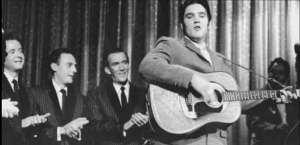Introduction
“Heartbreak Hotel,” the song that catapulted Elvis Presley into the limelight, is more than just a rock ‘n’ roll anthem—it’s a cultural phenomenon. This exploration unravels the bluesy allure and seismic impact of Elvis Presley’s groundbreaking hit.
Birth of a Rock Revolution
Rock ‘n’ Roll Genesis
“Heartbreak Hotel” marked a watershed moment in music history. Released in 1956, it epitomized the birth of rock ‘n’ roll, blending rhythm and blues with an edgy, rebellious spirit that resonated with the youth.
Elvis Presley’s Sultry Vocals
Elvis’s sultry vocals in “Heartbreak Hotel” introduced a new era in popular music. The combination of his charismatic delivery and the emotive lyrics struck a chord with listeners, making it an instant classic.
Decoding the Musical Blues
Bluesy Melody and Rhythm
The bluesy melody and rhythmic intensity of “Heartbreak Hotel” mirror the emotional turbulence of the lyrics. The song’s musical arrangement served as a blueprint for the emerging genre of rock ‘n’ roll.
Innovative Instrumentation
The use of innovative instrumentation, including Scotty Moore’s groundbreaking guitar work, added a raw, electrifying edge to the track. The combination of these elements set “Heartbreak Hotel” apart as a trailblazing composition.
Cultural Impact and Enduring Legacy
Chart-Topping Success
“Heartbreak Hotel” not only topped the charts but also became an anthem for a generation grappling with the social and cultural shifts of the 1950s. Its success marked a seismic shift in the music landscape.
Elvis Presley’s Cultural Influence
Elvis’s charismatic persona, fueled by the success of “Heartbreak Hotel,” turned him into a cultural icon. The song propelled him to stardom, and his influence on music and style transcended generations.
